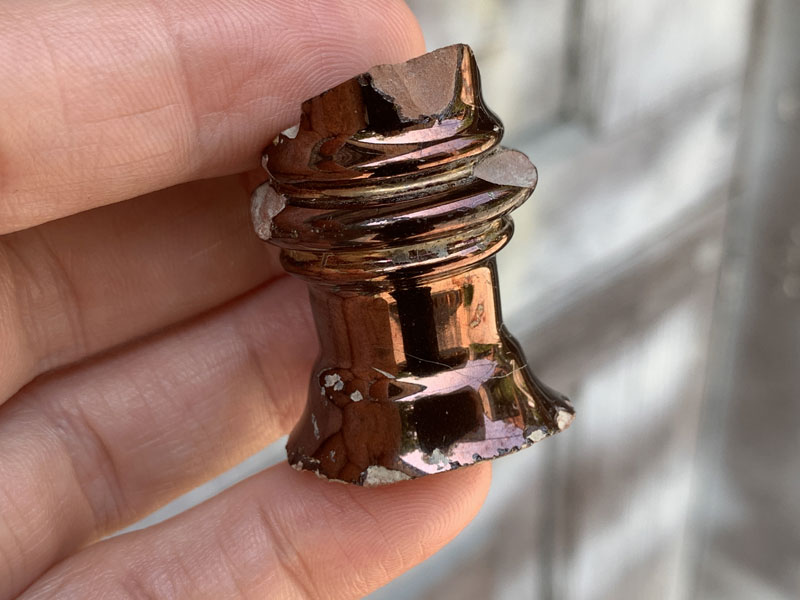Lustreware

Lustre is a decorative technique that was used on several ceramic wares, including refined white earthenwares, fine pasted red earthenwares, porcelain and stoneware. Lustre decorated wares are created when a thin metallic film is applied over the glaze of a vessel. When fired in a muffle kiln the metallic glaze would fuse to the body […]
New Insights Into Early Paleo (Gainey) Associations with Proboscideans and Canids in the Niagara Peninsula, Southern Ontario, Canada

This paper presents the results of protein residue and use-wear analyses on stone tools recovered during complete salvage excavations of the Mt. Albion West archaeological site, located in the Niagara Peninsula of Southern Ontario, Canada. Mt. Albion West is an Early Paleo (Gainey) locality that yielded evidence of four activity foci and dozens of Early […]
Archaeology and the Commemoration of the Irish Famine: A Report from Kingston
Across eastern Canada, Irish Famine commemoration sites remind us that geopolitical tensions are not a modern phenomenon, and they can have horrific consequences. The oldest memorial was erected in 1859, within living memory of the Famine, by railway workers to commemorate the thousands who died in fever sheds at Point St. Charles, Québec. In Kingston, […]
Frozen Charlotte

The so-called ‘Frozen Charlotte’ was a popular Victorian era doll made of white bisque porcelain. Its classic version is small and nude, with limbs moulded to the body. The dolls were mass-produced and inexpensive, the smallest version cost a penny. A sought-after toy, they were manufactured by the millions from mid-19th century into the early […]
Sentimental Jewelry in Colonial Canada: Conservation of a Sealed Locket from Stanley Barracks
A poster presentation showing the conservation treatments of a locket found at the Stanley Barracks site. The corrosion on this sentimental jewelry piece functioned to seal the edges of the locket, creating a possibility that a photo or lock of hair might be preserved inside. A treatment of mechanical removal combined with swabbing with diluted […]
Using Legacy Collections to Investigate Subtle Changes in Tionontaté Ceramic Artifacts

In 2014, ASI reached an agreement with Charles Garrad to assume curatorial responsibility for his archaeological collections, which represent his life’s work as an avocational archaeologist in the Collingwood area of Ontario. The collections are derived from 47 Tionontaté sites that date roughly from the 1450s to 1650. In the fall of 2017, a volunteer […]
Ironstone

Ironstone is a type of refined earthenware exhibiting a white, hard, almost vitrified paste, with a white thick glasslike glaze. Ironstone can often be characterized by having a network of very fine crazing appearing underneath the glassy surface. The background colour is white but tends to look blueish grey. Ironstone is often undecorated but may […]
Rockingham

The distinct decorative type known as Rockingham is a result of a combination of two glazes that create a mottled design. Rockingham is highly fired earthenware or stoneware that is generally buff to yellow paste with a brownish glaze. Rockingham can be manufactured in two ways. The first requires the vessel to be dipped in […]
Decalcomania

Decalcomania is a decorative technique in which intricate enameled images were transferred to pottery vessels. The first experimentation with decals occurred in 1830s Europe but it wasn’t until the 1870s that manufacturers in France made significant improvements to the technology leading to its perfection at the close of the nineteenth century. The term decalcomania means the […]
The Long Road to Collaboration: A History of ASI Relationships with Indigenous Communities with a focus on the Huron-Wendat Nation

Collaborative and community-based archaeology has been gaining traction over the last few decades. Increasingly, archaeologists are becoming aware that in many cases, they have been acting as stewards, and sometimes gatekeepers, over a heritage and history that was not their own. Engaging and working with descendant communities has been argued by many as a way […]


